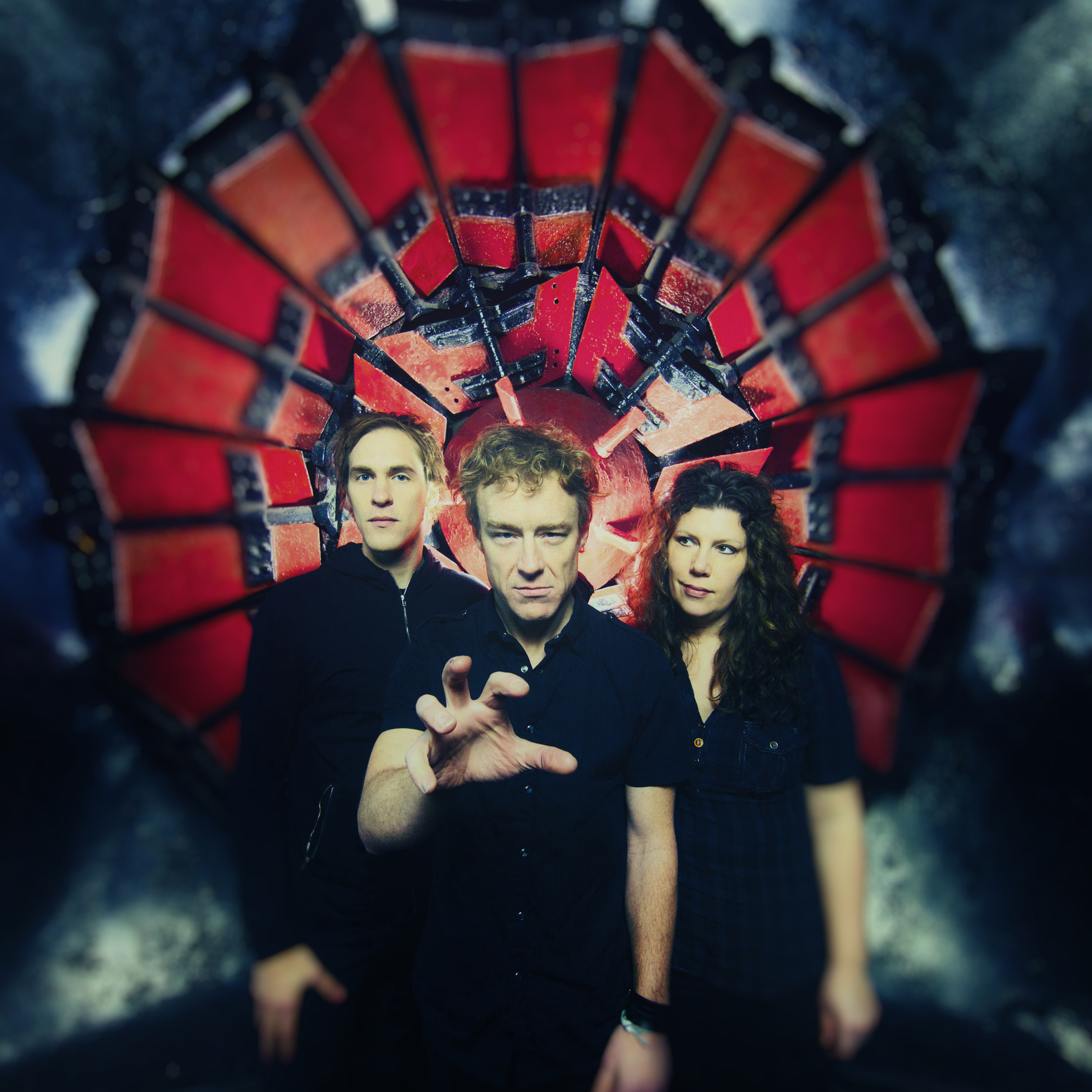Low, a three-piece Minnesota band, first became renowned back in the 90s for measured, dreamy, melodic performances that channeled raw emotion. Nowadays they are moving at a little faster tempo, and on Oct. 18, they are speeding up the I-29 for a long-awaited show at the West End Cultural Centre.
Driven by the impeccable harmonizing of couple Alan Sparhawk and Mimi Parker (elementary school sweethearts), the band has expanded its repertoire across 10 albums– incorporating elements of indie rock, textured soundscapes, and beautiful folk pop around the integral guitar-bass-drums foundation. They write about the personal, the political, and the spiritual (in fact, they are stereotype-busting Mormons).
Admired by music legends like Nick Cave, Robert Plant, and Neutral Milk Hotel, Low expanded its reach after touring with Radiohead and signing to Sub Pop records in 2004. Wilco leader, Jeff Tweedy, produced their most recent album, The Invisible Way (2013).
Sparhawk has been a compelling front man, practically shielding Parker and a few bassists over the years (currently Steve Garrington). He reflected on Low’s journey in a lengthy, candid interview (abridged here, believe it or not).
The Manitoban:Many of us sitting here in Winnipeg, less than 400 miles from Duluth, have wondered why this city isn’t on your list of frequent tour stops. Since your appearance at the Winnipeg Folk Festival almost a decade ago, why haven’t you played here, and why now?
Sparhawk: As close as it is, sometimes the close things end up being the most far away. Psychologically, anytime we tour west, the first thing we think of is to get right out to the coast. Mim (Mimi) and I grew up in northwest Minnesota, so Winnipeg was even closer than where we are now. [This time], it was a friend of our sound guy — she contacted me and said people could put together a good show. It took a poke, saying it’s been a long time. It’s the beginning of a tour with Slow Dive, and it fell [into place].
M: Because this is Low’s first show in eight years here, many people will hear you for the first time. How would you describe your music to a new listener?
Sparhawk: In a certain way, it’s just electric folk – kind of the same thing everybody’s been making. It’s true to our heritage so to speak: the kind of music that comes from this area, whether you talk about Dylan or Neil Young. There’s definitely sort of a local vibe, even though as kids we were probably trying to escape that. We’re slow, and mostly quiet, and we sing together [ . . . ] a lot. Sometimes it gets loud, and sometimes it’s a little dark [ . . . ] It’s kind of hard to describe without being self-deprecating.
M: Would you have given that same answer 21 years ago when you started out? Or how has your view of Low’s music changed over the years?
Sparhawk: I’ve come to accept more that I’m definitely a product of where I came from. When we started the band, we were trying to do something a little more avant-garde, more in the British tradition of post-punk. We were influenced and inspired by bands like Joy Division. When we were young, we were trying to create this new thing but the more you do it, the more you realize, ‘I’m a slave to my influences as much as anybody.’ If you’re being honest with yourself, you end up with your own voice and you don’t really have control over that. You just have control over whether you’re true to that.
M: As you reflect on your songwriting, are you happy with your music or do you revisit them?
Sparhawk: We don’t look back necessarily and say, ‘oh we should’ve done that different,’ or, ‘oh I wouldn’t write that song today.’ I find it really easy to let it go and [think] I put everything I could into it to this point. It frees you up to do whatever’s next, and with that you never have to regret anything.
M: What are some of your favourite Low songs?
Sparhawk: I’m pretty proud of the recording of “Breaker” (Drums and Guns) [ . . . ] I thought that song in particular, even though it doesn’t necessarily sound the way we sound, for me it’s a successful song and it amplifies the spirit of what we wanted [people to hear]. I’m really proud of “Holy Ghost” (The Invisible Way). I’m always pretty happy with how things go [so] I’d have to narrow it down to specific records! A lot of times it’s luck – when later on you go, ‘wow, the best [are] surprises that we didn’t plan.’
M: “Breaker” has one of the pithiest anti-war lyrics I’ve ever heard: “Our bodies break, as the blood just spills and spills / but here we sit debating math.” You’ve been able to tackle serious subjects. How does the world sit with you now – are you thinking and writing about politics and war, or turning away?
Sparhawk: I’m maybe not quite as lost and frantic, as I was, when those kinds of themes were coming out. Drums and Guns – a lot of that stuff feels to me like the moment you realize how fucked everything is, and the longer that feeling stays, it becomes more and more complex to express. The songs were very much me throwing my hands up in the air, screaming at mankind. It’s kind of hard to talk about without giving away more than what I really feel is worth talking about.
I actually have a few songs I’ve written that I’ll probably never record. It [would be] calling [things] out even more and doing so in a way that most people wouldn’t understand. I think it would be taken wrong. Too blunt and controversial because I’m dealing with religion. It’s too volatile. The song “Murderer” is an accurate moment of trying to cross violence and religion. That’s as close to the edge as I can dance without [ . . . ] stepping on shit and making it worse.
It’s difficult today to be an artist [and] speak about world events. There’s a responsibility there [ . . . ] but it’s problematic. It’s fraught with cliché, sensitive words, words that have been poisoned by propaganda. [As a society], we’re too hung up on the language now to actually say anything.
M: Some of the noticeable changes on 2013’s The Invisible Way are that Mimi sings lead more, and though the sound seems to return to a minimalist vibe, you continue to vary the tempo more than on your earlier recordings. Do those impressions resonate with you, or what’s the album all about?
Sparhawk: That’s essentially what’s going on. Mim wrote more songs. I think the minimalism kind of came as we were working on the songs and demoing them. The minimalism – that’s something we’ll always lean towards if there’s a decision, but on different records we’ve sort of elaborated. Most of the time, we’re trying to keep it trim –try stuff and then pull it out, unless it’s adding something significant to the dialogue or the picture. With The Invisible Way, we really worked quickly. We were prepared, so there wasn’t a lot of experimenting. Essentially because we could only afford so much [studio] time!
M: Mimi has said previously that she is much more “comfortable in the background.” Did you give her a push into the lead, or did something change for her?
Sparhawk: We’re always pushing [Mim] to write because the stuff she comes up with is really good. I like writing, and I can admit there’s a little ego part of me that looks forward to being the guy that’s singing the songs. I don’t mind being that front face, even though more so than anyone would realize it’s dependent on Mim and Steve – their presence is vital. Mim doesn’t have any aspiration to be looked at or listened to any more than she has to be. But she wrote more songs this time, so I was like, ‘let’s do yours first!’
M: Jeff Tweedy of Wilco produced The Invisible Way. What was the main thing he brought to the studio or your process? How was that different from working with previous producers?
Sparhawk: A lot of what Jeff brought was his familiarity with his studio; he knows his instruments and what he can do with his space and the equipment. He has a really good engineer, Tom Schick [ . . . ] We had really worked a lot on our arrangements, so he really just guided us with takes. Knowing how to finesse the right sounds, getting everybody comfortable, feedback, [and] a little cheerleading.
[Past producers] were more technical and we were responsible for motivating ourselves. If you can go in and just play your tunes and not have to be also listening at the same time to go, ‘is this any good?’ – it makes a huge difference man! Then you’re actually playing music.
M: You produced fellow Minnesota band, Trampled by Turtles’, latest album, “Wild Animals.” Next thing you know, they’re on Letterman, and you’re joining them on tambourine and backing vocals. Describe that experience, as well as working with the band.
Sparhawk: The Letterman thing–I think [the band] was just being nice. That was very sweet of them letting me tag along. Definitely a dream come true.
A lot of the way I first experienced music was on TV. When I think about a band, I often think about them being on TV, being on a late night show. The Ed Sullivan show. The Replacements on Saturday Night Live: that shit was over the top, life-changing.
[Trampled by Turtles] are from Duluth here [ . . . ] there’s been some flirting with Low over the years. In the past, they’d done the records just with an engineer, two days, [sometimes one take]. They’re a great band,, they’re all on the same page. I knew that was there and it didn’t need to be dicked around with. I guess [I’m someone they trusted].
M: The most recent thing Low has released is for a compilation: “I’m on Fire”– a Springsteen cover (from “Born in the U.S.A.”). Are you a huge fan? Would you consider him an influence, or just music you love? Why this song choice or assignment?
Sparhawk: We picked it. I’ve always loved that song. It’s pretty elusive. It’s short. Initially, we thought we’d have to take a song and slow it down [ . . . ] but when we played it, it only sounds awesome if you’re kickin’ it. That record was right in our wheelhouse as far as the generation. We were in high school, so it was sort of the anchor American record at that time. [But] I think I was already getting a little snooty with my Clash records and stuff.
M: What is another song you really want to cover for a tribute album like that, if you could chose from a wish list?
Sparhawk: If it was a Clash tune, probably something from “Combat Rock.” One of my favourite songs ever is one called “Final Solution” by Pere Ubu. Mid-to-late 70s, and it sounds heavy and intense. It’s like Roxy Music meets Bauhaus meeting something [ . . . ] We’re working on a few more covers; it’s been a fun thing lately. A Marvin Gaye song [ . . . ] it’s a lot to bite off.
M: Robert Plant covered two of your songs for his 2010 Band of Joy project. What’s it like being on the other end, having legendary musicians pay tribute to your music?
Sparhawk: It was pretty much everything you could imagine. Super flattering. Anybody that has sat down and written a couple of songs has fantasized about someone famous hearing your song and saying, ‘I want to do that song.’[ . . . ] It was really out of the blue. From what we can tell, he came across our record when he was at a store – some clerk was playing it. He took it home and spent a lot of time with it. We didn’t find out until the record was just about out. I didn’t believe it. We met him [ . . . ] and he made us feel like the coolest people on earth.
M: What’s next for Low? Collaboration? Writing new music?
Sparhawk: We’ve got roughly half a record figured out, and half in fragments. We’ll try to record this winter. We’re trying to figure out who we would work with and what kind of parameters to put on it.
M: So, at this point in your career—after the many albums and all the touring, juggling your personal struggles, family life and the commitment to the music, what do you feel you get back from music—what is it still teaching you or enabling for you in your lives?
Sparhawk: [It’s] a firm belief that this is what we do. Every time we write a new song, it’s an affirmation: here’s a song that needs to be done. [Though] writing is a chore — it’s difficult and humiliating — it can bring out the best and the worst in [you]. It’s a lesson in how much you are nothing. It can be a very spiritual lesson.
There’s something mystical going on. It’s an affirmation of [ . . . ] if you want to call it God, or spiritual, or a higher eternity. There’s something about creating a song, once it exists and it’s been communicated to someone else. It’s a similitude to actually creating [ . . . ] in the same way that maybe God does. In many ways being creative [ . . . ] is a little microcosm into the nature of a God and therefore, ourselves.
Even if all that is complete bullshit, there’s something going on, there’s something there. I know it, I’ve felt it, and it’s life affirming. For me it’s a language I depend on.
Low plays the West End Cultural Centre on Saturday, Oct. 18, with fellow Minnesotan minimalists Zoo Animal.





